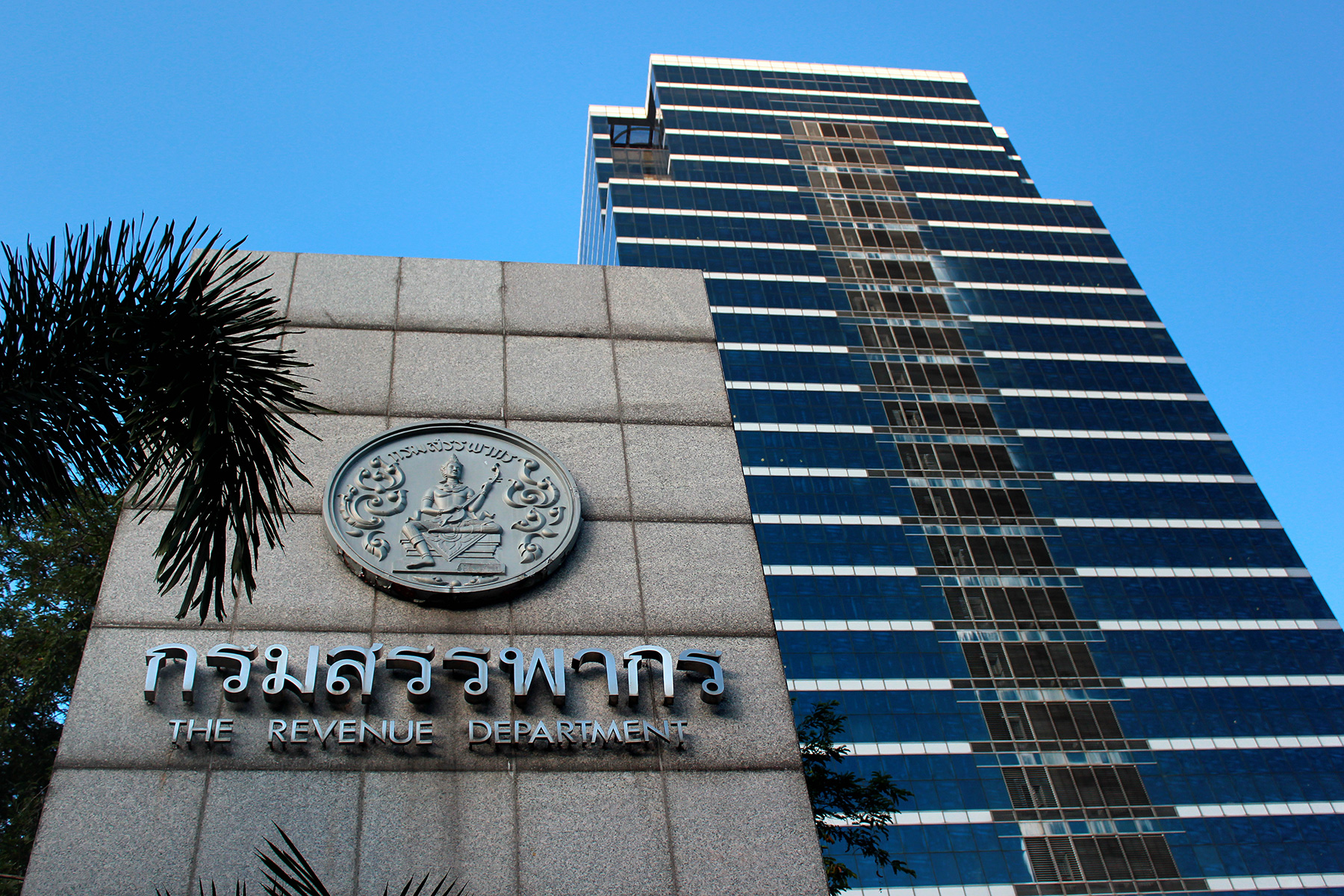If the thought of income tax makes your head spin, Thailand will (maybe) surprise you. The rules here are clear once you know where to look, and there aren’t as many hidden twists as you might expect.
Whether you’re new in town or planning your move, here’s how Thai income tax really works:
Income tax in Thailand: overview and latest developments
The Revenue Department (กรมสรรพากร) of the Ministry of Finance (กระทรวงการคลัง) is responsible for administering Thailand’s tax system.
Thailand’s tax year runs in line with the calendar year, from 1 January to 31 December. Married couples can choose to file tax returns jointly or individually. Social security (ประกันสังคม) contributions are made separately.

Personal income tax (ภาษีรายได้ส่วนบุคคล) in Thailand is payable on the following forms of income:
- Employed income (รายได้จากการทำงาน): Salaries and employment bonuses are taxed at progressive rates of 0–35%
- Self-employed income (รายได้จากการประกอบอาชีพอิสระ): Self-employed workers must pay income tax on their earnings at the same rates as employees, but allowable deductions depend on the type of income.
- Business income (รายได้จากธุรกิจ): Incorporated businesses in Thailand are not subject to income tax. Companies instead pay corporate tax on profits. The standard corporate tax rate is 20%. Companies with lower profits can benefit from a reduced rate of 15%.
- Savings and investments: Interest on bank deposits, dividends, and investments are subject to income tax. If you earned less than ฿20,000 in interest from a Thai account, this can be excluded from your tax return. Tax credits are available against dividend income from locally incorporated companies.
- Shares: Gains from selling shares are subject to income tax. Sales of securities listed on the Stock Exchange of Thailand (ตลาดหลักทรัพย์แห่งประเทศไทย) are exempt. Non-residents must pay a rate of 15% on share sales.
- Rental income: Rental income is taxed at the standard income tax rates. Some deductions are available. Property investors can deduct expenses at a flat rate of 30% or offset their actual expenses, provided they have evidence. Rental income is subject to a 5% withholding tax (15% for non-residents).
Latest news about Thai income tax in 2026
Thailand’s new rules on taxing foreign-sourced income brought into the country by Thai tax residents – introduced in 2024 – now fully apply. This means that foreign income earned by tax residents after 1 January 2024 is taxable unless exemptions apply.

Personal income tax brackets for 2026 are the same as they were in 2025. However, there are plans to cap income tax deductions beginning in the 2027 tax year.
Tax rates: how much will I pay in Thailand in 2026?
Thailand’s income tax brackets are progressive. The top income tax rate is 35% and is payable by people who earn more than ฿5 million a year. The tax brackets for 2026 are the same as for 2025, and are as follows:
| Income tax band | Tax rate |
| Up to ฿150,000 | 0% |
| ฿150,001-฿300,000 | 5% |
| ฿300,001-฿500,000 | 10% |
| ฿500,001-฿750,000 | 15% |
| ฿750,001-฿1 million | 20% |
| ฿1,000,001-฿2 million | 25% |
| ฿2,000,001-฿5 million | 30% |
| ฿5 million and above | 35% |
Who pays income tax in Thailand?
Who needs to file a tax return in Thailand?
Residents of Thailand who earn more than ฿120,000 (individuals) or ฿220,000 (married couples) per year must file a tax return. The deadline for filing the tax return is 31 March (for paper returns) or 8 April (for online returns).
Thailand’s income tax for foreigners
In Thailand, income tax liability varies according to your residency status. You’ll be considered a resident for tax purposes if you live in Thailand for 180 days or more in a calendar year. Tax residents pay income tax on any income earned in Thailand and worldwide.

People who live in Thailand for fewer than 180 days in a calendar year are considered non-residents and are only taxed on income earned while in Thailand. If you have made money and plan to leave the country during a tax year, you’ll need to obtain a tax clearance certificate to prove that you don’t have outstanding liabilities.
Again, Thailand has double taxation agreements with over 60 countries. The exact rules for double taxation vary depending on the specific agreement. You can find the full list of treaties on the Revenue Department’s website.
Who is exempt from paying Thailand income tax?
It’s not so much ‘who’, but rather ‘what’ is exempt.
The first ฿150,000 of income is exempt from income tax. In addition, individuals aged 65 or over are entitled to an extra personal allowance, which reduces their taxable income further.
How do you file your tax return in Thailand?
How to register for tax in Thailand?
To register to pay income tax, you’ll need to obtain a taxpayer identification number (TIN – หมายเลขประจำตัวผู้เสียภาษี). This is a unique 10-digit ID number that you can get from the Revenue Department.
Which forms do I need to fill out?
You can file your return using the online e-filing system (ระบบยื่นแบบอิเล็กทรอนิกส์) or via the RD SmartTax app (แอป RD สมาร์ทภาษี ). Both are in Thai. If you wish to file a paper return in person, you must do so at your local Revenue Department Area Office.
The most commonly used tax return forms in Thailand are Forms PND 90 and PND 91. Individuals and couples who only need to file their employment income use Form PND 91. Those with other income to report (for example, income from self-employment) must file Form PND 90.

Deductibles and tax relief
There are several allowances for taxpayers in Thailand that you may be able to use to reduce your tax bill, including the following:
Family-related
- Personal and spousal allowance (เงินช่วยเหลือส่วนตัวและคู่สมรส): Each taxpayer has a standard ฿60,000 personal deduction that applies to a personal return. A further ฿60,000 is available if you have a dependent spouse.
- Child allowance (เงินสงเคราะห์บุตร): Parents can offset ฿30,000 for each child born before 2018 and ฿60,000 for each child born in or after 2018. Non-residents can only claim child allowances if their child is a tax resident or legally dependent on them.
- Caring for family members (การดูแลสมาชิกในครอบครัว): Taxpayers who support parents aged 60 or over whose annual income does not exceed ฿30,000 may claim an allowance of ฿30,000 per parent. A higher allowance of ฿60,000 applies for each disabled or incapacitated dependent, subject to official certification.
Housing-related
- Mortgage interest (ดอกเบี้ยจำนอง): Deductible for the purchase or construction of a residential property, up to a maximum of ฿100,000
Health insurance-related
- Health insurance premiums (เบี้ยประกันสุขภาพ): Health insurance is deductible up to a maximum of ฿25,000.
- Pregnancy allowance (เงินช่วยเหลือการตั้งครรภ์): Expectant mothers can deduct ฿60,000 for each pregnancy.
- Life insurance premiums (เบี้ยประกันชีวิต): Premiums paid on qualifying life insurance policies issued by Thai insurers, with a minimum policy term of 10 years, are deductible up to ฿100,000 per year. Pension (annuity) insurance premiums may be deducted separately, up to 15% of income, capped at ฿200,000.
Work-related
- Employment allowance (เบี้ยเลี้ยงการจ้างงาน): Taxpayers in employment can benefit from a standard deduction of 50% of income up to a maximum of ฿100,000.
- Retirement mutual funds (กองทุนรวมเพื่อการเกษียณอายุ): Contributions to RMFs are deductible up to 30% of assessable income, subject to an annual cap of ฿500,000 and an overall retirement savings limit shared with other qualifying retirement funds.
- Travel costs: Reimbursement of work travel costs, flat-rate travel allowances (in line with the government’s rates for official travel), and expenses incurred to get to a place of employment for the first time are not taxable. Other travel allowances must be specified in your tax returns.
Other
- Super savings fund investment (การลงทุนกองทุนซุปเปอร์ออมทรัพย์): Contributions to SSFs are deductible up to a maximum of ฿200,000 per year, subject to applicable income-based limits.
- Charitable contributions (เงินบริจาค): Deductible up to 10% of net income. ‘Double’ deductions are available for some donations, such as those to state hospitals. Donations to political parties are deductible up to a maximum of ฿10,000.
Limits to the above deductions
In Thailand, the combined annual deduction for retirement savings — including provident funds, government or teacher pension funds, pension (annuity) insurance, retirement mutual funds (RMFs), and the National Savings Fund — is capped at ฿500,000 per person. Life insurance premiums and Super Savings Fund (SSF) investments are subject to separate deduction limits and are not included in this cap.

Expenses for self-employed workers
Self-employed workers have two options for offsetting their business costs against their tax bills. First, you can itemize your actual expenses and deduct them from your profits. If you do this, you’ll need to supply supporting evidence of the costs you’ve incurred.
Alternatively, you can choose to take the standard deductions outlined in the Thai Revenue Code for various types of expenses. You may find it helpful to get expert advice on the best option for your specific situation.
How do I pay my Thai income tax?
After you’ve filed your tax return, you’ll need to pay any tax due. There are various ways to pay your tax.
For example, you can pay via online or mobile banking, by card, or with a money order. Other methods include using ATMs or making in-person payments. Fortunately, if you owe more than ฿3,000 in tax, you can request payment in three equal monthly installments.
Income tax refunds
If you’ve paid too much income tax in Thailand, you should automatically receive a refund from the Revenue Department. If you’re expecting one, keep an eye on your account online to see if you’ve received any messages from the Revenue Department. Any payment due will be made to your account using the PromptPay system.
What happens if I don’t pay on time?
Failure to file or pay personal income tax on time in Thailand may result in a surcharge of 1.5% per month (or part of a month) on the unpaid tax, together with an administrative fine of up to ฿2,000 for late filing. Where a taxpayer fails to file a return, the Revenue Department may impose an additional penalty of up to twice the amount of tax due, depending on the circumstances.
Intentional failure to file a tax return or deliberate tax evasion is a criminal offence and may be punishable by a fine of up to ฿200,000 and/or imprisonment of up to one year. Serious cases involving fraud or false documentation may result in imprisonment of up to seven years and a fine of up to ฿200,000.
Income tax advice in Thailand
If you have specific questions about filing your income tax return in Thailand, consider taking advice from an English-speaking professional. The Thailand Federation of Accounting Professionals (TFAC – สภาวิชาชีพบัญชีแห่งประเทศไทย) provides accreditation for companies.
Useful resources
- Revenue Department – information, rates, and forms for taxes in Thailand
- Allowable income tax deductions – breakdown of personal income tax
- Download tax forms online – self explanatory





